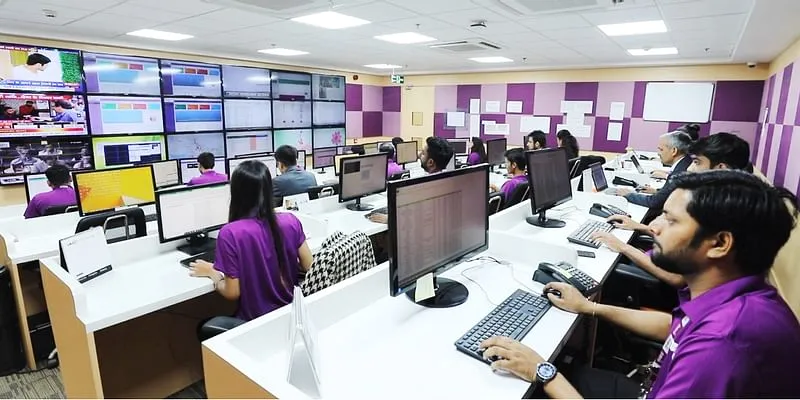Surveillance tech at 1,000 locations across 3 countries: here's how this ex-Army man's son makes it happen
In 2014, Gurugram-based Anuj Rajain started Soteria under his father’s Rs 1,800 Cr Tenon Group. Today, Soteria’s security and surveillance technology monitors over 1,000 locations in India, Singapore, and UK across IT/ITes, telecom, retail, education, and manufacturing industries.
For seven years, Major Manjit Rajain was actively engaged in the Indian Army operations in Rajasthan and Jammu and Kashmir. After his service, he joined the police force and was posted as an Assistant Commissioner of Police in Jammu and Kashmir.
In 1995, he decided to utilise his extensive knowledge on security solutions and start a private business. This idea led to the birth of Peregrine Guarding in Gurugram, Haryana.
Manjit began providing business services such as manned guarding, canine squads, security survey, consultation, and security for special events. He even expanded into threat risk analysis and critical vulnerability analysis for businesses.
In a span of 25 years, the ex-serviceman grew his business into a leading security provider in India. Manjit’s initiative set the ball rolling for the launch of a number of integrated security service businesses under the parent organisation Tenon Group.
Tenon Group, a homegrown conglomerate, has under its umbrella: facility management business Tenon FM, remote surveillance service business Soteria, and Peregrine Guarding.
It has an annual turnover of over Rs 1,800 crore and employs over 80,000 people across India, Singapore, and the UK.
Today, Manjit is the Global Chairman of Tenon Group.
Soteria, the technology services company for security operations and facility management, is founded and led by his son Anuj Rajain.
The Soteria business
“Traditionally, the security industry has been manpower intensive. But the cost of manpower is increasing the day. I realised there was going to be an inflection point when a client would say they have a limited budget but want all our security services. This called for a different, technology-driven security solution,” says Anuj in an interview with SMBStory.
The Tenon Group already had a platform for facility management and private security. Anuj went to the parent company and reviewed how things worked, and gathered information about the security gaps faced by clients.
He spent three months visiting client sites and interviewing various process leaders.
Anuj realised it was too early to go for AI solutions, but if he could start on a journey of automating technology to complement manpower, it would be a huge leap for the industry.
“At that point, we decided to partner with IBM’s new product which was the smart city version of the IBM Watson AI tool. This provided us the technology platform required on the back end to set up a command centre. With an initial investment between Rs 8 crore and Rs 10 crore, we started Soteria in 2014,” he says.
Soteria began as a business, offering remote surveillance via CCTV. But after 18 months, Anuj realised the vision was too narrow. The company was functioning like a technology business within a security company.
Its market was vast and there was more scope to deliver end-to-end remote surveillance solutions such as real-time security responses to events, integration with existing camera setups, video analytics, and more.
“We set up a state-of-the-art control and command centre in Gurugram that offers remote surveillance services. The command centre predicts, manages, analyses, and communicates environmental deviations for certain events,” Anuj says.

The Soteria command centre
A difficult start
Tapping into the parent company’s network to land its initial client introductions and meetings, Soteria began meeting potential B2B customers in the banking sector.
“On the personal front, this posed a challenge to me. How do I get clients to take a 23-year-old businessman seriously? I would take a senior member from the group company along with me so that the clients would focus on the security solutions being offered,” he says.
But no matter who went for the meetings, Anuj observed that 90 percent of the clients were completely unaware of the kind of security solutions Soteria was offering.
“We were ahead of time when we started. Since clients were not aware, they were not confident to test the waters with us as they thought our solutions were too futuristic. There were many industries which felt that a physical guard standing outside the premises was still the best solution,” he says.
After extensive research on clients and landing the first customer - an American aeronautical research agency – Soteria faced a completely different challenge during project implementation.
On paper, the security process looked organised but when Anuj set out to implement the technology, he saw many loopholes he hadn’t thought of before.
“There were many more gaps that needed to be addressed. In physical security or facility management, a problem can be streamlined in a month or so, but not for us. We took five to six months to solve the problems for the first client,” he explains.
Providing custom security solutions
These experiences taught Anuj that he should not go to potential clients with a pre-made solution. He realised that he should first talk to them to understand the standard operating procedures (SOPs) they were using in running an office branch or a warehouse.
Soteria could then identify existing loopholes around the security or administrative activities of a client and customise its solutions accordingly.
Once Soteria adopted this approach, Anuj realised that the solutions could be customised not only for the banking sector but also for housekeeping, warehousing, and ancillary support functions such as generator sets, power backups, and fire safety sensors.
“We diversified to provide holistic security solutions across industries. In 2019, we crossed 1,000 locations that are being monitored by Soteria. We are now providing unique solutions for hygiene protocol management for CureFood – the food and beverage division of that runs EatFit,” he says.
Soteria's solutions are hardware-agnostic, allowing it to service a wide range of clients in industries such as IT/ITes, telecom, retail, education, and manufacturing.
Soteria first carries out trials to see whether it can work with the client’s security infrastructure so that customers don’t have to spend on new technology or hardware. The company then works on its solutions and implements it on existing security hardware.
“We have an advantage which is rare in our industry. We can provide complete integrated facility management. We can do anything related to outsourcing of services because we are part of a larger organisation and have the capability to offer blended solutions. Tenon FM can plug in facility management needs while Peregrine complements our online security solutions with its manpower,” he explains.
This end-to-end process gives Soteria an edge over large CCTV manufacturers that are its competitors. “We have better processes and we keep innovating with our clients for no additional or incremental cost,” he adds.
COVID-19 impact and future plans
The complementary and innovation-focussed business model has worked well for Tenon and Soteria during the COVID-19 pandemic.
When the novel coronavirus struck India, Tenon offered companies its integrated and specialised office sanitisation services, as well as deployment of more well-trained security personnel at private and public facilities.
Amazon, , , Marriott, HDFC Bank, Tupperware, and are some clients that signed up for the service.
Soteria’s contactless thermal screening solutions, facial recognition, visitor management services, and access control offerings are being adopted by large workspaces.
Its security technology services are also bringing additional value for banking customers. Anuj explains:
“COVID-19 has put people in difficulty. There is a desperate need for money and people are looking at various sources. This has increased the number of situations we have to handle to a large extent. We now have one or two attempts of robbery taking place every week. Our banking clients are satisfied when our security solutions help prevent such incidents.”
Soteria is now aiming to become a globally-recognised leader in remote monitoring and surveillance services. It has plans to strengthen its foothold in its existing sectors and work its way into new markets.
“We want to continue growing organically and boost our growth inorganically through acquisitions and by exploring more opportunities,” Anuj says.
Soteria appears to be on track as the global video surveillance market continues to expand. A MarketsAndMarkets report estimates that the industry will grow from $ 45.5 billion in 2020 to $ 74.6 billion by 2025, at a CAGR of 10.4 percent.
Growing incidents of thefts, robberies, and other crimes are leading to increasing adoption of Internet Protocol (IP) cameras and surveillance technologies. The trend of city-wide surveillance is also contributing to demand for such solutions in India.
Edited by Javed Gaihlot








